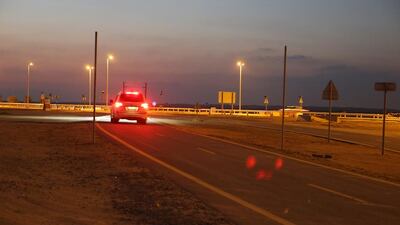DUBAI // Cyclists expressed concerns about safety after cars were seen using dedicated cycle tracks.
People on desert camping trips and construction vehicles were among the main culprits on tracks at Al Qudra and Nad Al Sheba, according to cyclists.
“It does seem to be an issue that is getting worse, particularly at the weekends,” said Bradley Manser, 44, from South Africa.
Mr Manser uses the tracks at least twice a week.
“A couple of weeks ago, I was with friends and we had a close call with a driver going out camping with his family,” he said.
“Then, the guy verbally abused us before going on his way.”
Some of the hotspots include the 18-kilometre straight known as the “stick” at Al Qudra, as well as sections of the loop.
“With it being winter, we get a lot of desert campers who end up just driving across the path or parking at the roundabout about 4 kilometres along the straight,” Mr Manser said.
“There is a lot of construction work around the loop area, so you see many heavy vehicles going on the track. “I’m not too sure what can be done about it, to be honest.”
Most driving on the tracks appears to take place on Friday and Saturday mornings, he said.
“But I also believe that cyclists need to take responsibility and when they do see another vehicle on the track,” he said.
“I’ve seen people who spend thousands of dirhams on a new bike but then don’t bother getting a helmet.”
Bad signalling and motorists who do not pay attention to other road users are among other big concerns for cyclists in the emirate.
“The whole idea behind having dedicated cycle tracks is to have a safe environment for people to use,” said Shaun McPherson.
He called for tighter security to prevent motorists from using the cycle paths.
“This is as much about education as anything else and the more we can inform the general public about road safety, the better for all of us.”
nhanif@thenational.ae

